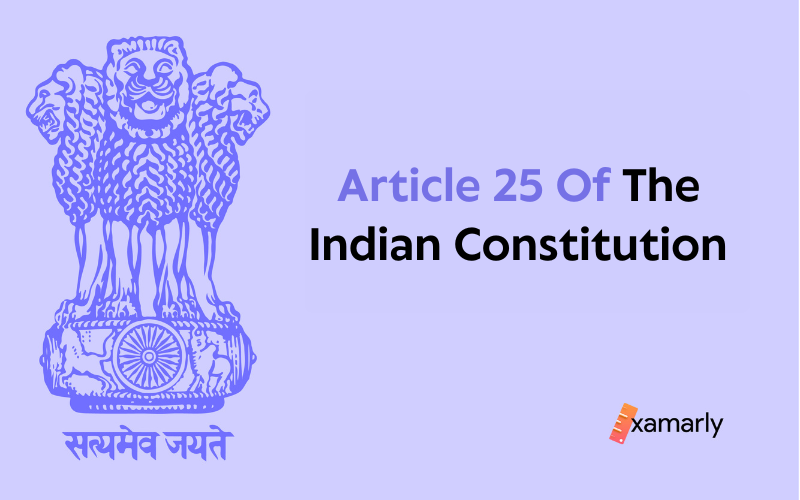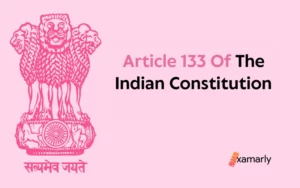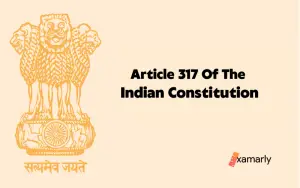India is a secular country. Constitution makers dedicated Articles 25 to 28 of the Constitution of India to deal with components of freedom of religion and the practice of religious activities. Article 25 of the Indian Constitution specifically guaranteed the freedom of religion. However, there are many demands for changes and debates associated with grounds of religious worship and practice.
Let us read up on this more to figure out what article 25(1) and 25(2) are; restrictions, demands for the amendment to article 25, and case laws.
- What Is Article 25 Of The Indian Constitution?
- Constitutional Provisions
- Concept Of Freedom Of Religion
- Constituent Assembly Debates
- Restrictions on Article 25
- Demand For Amendments To Article 25
- Important Supreme Court Judgements
- The National Anthem Case: Bijoe Emmanuel v. State Of Kerala
- M Ismail Faruqui v. Union Of India
- Triple Talaq: Shayara Bano v. Union Of India
- Restrictions On Freedom Of Religion: In Re-Noise Pollution Case
- Conclusion
- FAQs
What Is Article 25 Of The Indian Constitution?
Article 25 of the Constitution of India also guarantees the freedom to practice religion to all citizens, religious groups, and religious institutions. It states that every person is free to profess, practice, and propagate any religion. It also gives religious denominations the right to administer their own affairs.
As per Article 25, citizens have the right to religious freedom and the free profession, practice, and propagation of religion
- Article 25 (1) – All persons have freedom to conscience and the freedom to profess, practice, and propagate religion, subject to public order, morality, and health, as well as the other provisions of this Part.
- Article 25 (2) – Nothing in this article shall interfere with the operation of any existing law or prevent the State from enacting new legislation.
- (a) limiting or controlling any political, financial, economic, or other non-religious activity that is connected to a religion
- (b) ensuring social welfare and reform including making Hindu religious institutions of public character accessible to all sections of people
Constitutional Provisions
Rights To Citizens
- Freedom of Conscience: The freedom an individual possesses to form and shape their own relationship with God in whatever manner they desire fit.
- Right to Profess: The right to practice one’s religious faith with utmost freedom and openness.
- Right to Practice: The freedom to practice religious worship, rituals, ceremonies, and the exhibition of beliefs and ideas.
- Right to Propagate: The transmission and dissemination of one’s religious beliefs to others, or the exposition of one’s religion’s tenets. It does not, however, include the right to convert another person to one’s own religion. Forcible conversions violate the freedom of conscience guaranteed to all people.
Power Of State
The state also has the authority to enact legislation that
- controls and prohibits any monetary, political, or other secular activity related to the practice of any religious
- permits both social welfare and the reform of public Hindu religious institutions
Concept Of Freedom Of Religion
Unlike the Constitution of the United States, the Indian Constitution provides a definite and guaranteed right to freedom of religion. This right is intended to ensure that religion does not intermix politics and state interests. In fact, the constitution envisions a secular model of government.
The Supreme Court has held that the concept of secularism is a key part of the Indian Constitution. This means that the state cannot interfere with religious affairs, including the acquisition of property. It also prohibits the levying of taxes on religion.
Article 25 grants the right to practice religion, but only if it is done in a way that conforms with public order. This does not include performing religious rituals in public places or sacrificial animal sacrifices. The court has also ruled that there is no constitutional prohibition against studying religious philosophy.
Constituent Assembly Debates
The right to conscience and the free profession, practice, and propagation of religion were hotly debated in the constituent assembly, with some members expressing reservations and others defending article 25.
- Prof. KT Shah and others were concerned that the right to propagate would facilitate forced conversions and proposed amendments or removal of this clause or religious practice in the private sphere.
- Forcible conversions, according to Lakhsmi Kanta Maitra and others, are not covered by this right, and it will promote understanding and peace.
Check out the linked articles from the table given below to boost your UPSC Preparation.
Restrictions on Article 25
Article 25 of the Constitution of India deals with religious practise. Additionally, Article 26 explains that the right to freedom of religion is not absolute.
- Religious freedom is not absolute. There are some reasonable restrictions. The state shall exercise its powers to restrict religion in public order, in the interest of public health, and in other circumstances that are reasonable.
- The authority to convert someone to one’s own religion is not granted by Article 25. Because everyone has the right to “freedom of conscience,” forcible conversions are not permitted.
- This law does not allow people to perform animal sacrifices or religious rites in a crowded roadway or public place such that it disturbs others.
- The use of loudspeakers, voice amplifiers, firecrackers, and the beating of drums in temples or mosques were problematic under Article 25. The use of firecrackers for religious occasions had been scrutinized by the Supreme Court, which limited the time crackers could be exploded.
Demand For Amendments To Article 25
Many believe that Article 25, despite what it wishes to uphold, doesn’t stand by the ideals of secularism. The main reason for this criticism to come about is regarding the inclusion of Sikhs, Jains, and Buddhist religions as part of the Hindu religion rather than separate religions in themselves. This raised a demand for amendment. Sikh leaders have spearheaded this demand to amend clause (b) of Article 25 of the Constitution of India which specifies freedom subject to religious non- Hindu minority.
Important Supreme Court Judgements
The National Anthem Case: Bijoe Emmanuel v. State Of Kerala
Three children from a religious sect (Jehovah’s Witnesses) refused to sing the national anthem “Jana Gana Mana” and were expelled from school by the headmistress. The Supreme Court ruled that the schoolchildren did not show disrespect by standing up during the national anthem. Forcing them to sing is thus a violation of Article 25.
M Ismail Faruqui v. Union Of India
The Supreme Court pointed out that the presence of a mosque is not the most crucial component for practicing Islamic beliefs. Muslims can perform their religious prayer or Namaz anywhere. Thus, the presence of a mosque is not necessary or mandatory.
Triple Talaq: Shayara Bano v. Union Of India
Talaq-e-biddat, also known as triple talaq, is a type of divorce in which a Muslim man can divorce his wife by saying “talaq talaq talaq.” The case was heard by a five-judge Supreme Court judge bench to determine whether triple talaq is a matter of faith for Muslims and whether it is part of their personal law. The court proclaimed that this practice is unlawful and unconstitutional with the provision of the 3:2 majority.
Restrictions On Freedom Of Religion: In Re-Noise Pollution Case
In this case, the Supreme Court of India issued specific directions to be followed in order to control noise pollution in the name of religion, such as a ban on firecrackers and loudspeakers between 10 p.m. and 6 a.m.
Conclusion
In conclusion, Article 25 of the Constitution of India has been the bedrock of secularism and religious harmony. It is one way of promoting harmony among people following different beliefs. It has also been a constitutional provision that has been questioned and debated. It deals with freedom of expression of one’s religion which is an important component of any human life.
FAQs
What Do You Mean By Freedom Of Conscience?
It is the freedom an individual possesses to form and shape their own relationship with God in whatever manner and form of worship they desire fit.
What Do Articles 25 To 28 Of The Constitution Of India Deal With?
It deals with various components of freedom of religion like the freedom to practice religion, management of affairs, freedom from taxes for charitable purposes and religious development, religious worship at education institutions, etc.
What Is Article 25 All About?
Article 25 guarantees everyone the right to conscience freedom as well as the freedom to freely profess, practice, and propagate religion, subject to public order, morality, and health.
Which Part Of The Indian Constitution Speaks About Article 25?
Part III of the Indian Constitution speaks about one of the fundamental rights, which is the right to freedom of religion. This part covers Article 25 of the Indian Constitution.






